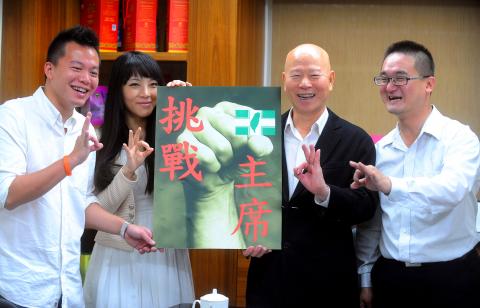The Democratic Progressive Party (DPP) would be prepared to seek active engagement with China, but would not change its policies to achieve that goal if he were elected party chairperson next month, former DPP chairperson Hsu Hsin-liang (許信良) said yesterday.
Hsu, one of five candidates running in the May 27 DPP chairperson election, focused on his China policy during a meeting with some of the party’s younger members yesterday.
“I would support the DPP’s engagement with Beijing and do not rule out visiting China myself, but I would not change our policies in order to make such a trip happen,” said the 70-year-old, who analysts consider the most moderate of the candidates in terms of China policy.

Photo: Wang Yi-sung, Taipei Times
Hsu said that he did not think it was necessary to rescind the Taiwanese independence clause in the party charter for engagement with Beijing, because “we can not deny our own history.”
“There is no such thing as abandoning Taiwanese independence. As Taiwan is now an independent country, how would we give it up? That’s simply impossible,” Hsu said, adding that he had always advocated a policy that “guarantees the political status quo before boldly opening up.”
However, the Taiwanese independence clause in the DPP charter could be replaced with a new resolution, he said.
Hsu said that former DPP chairperson Tsai Ing-wen’s (蔡英文) proposed China policy of “Taiwan is the Republic of China [ROC] and the ROC is Taiwan” would be a good place to start and could be drafted into an official document, to highlight the party’s recognition of the ROC political system.
However, Hsu said he favored the “constitutional consensus” advocated by former premier Frank Hsieh (謝長廷) over Tsai’s “Taiwan consensus,” because consensus on a constitution would incorporate a broader swathe of public opinion and therefore hopefully end internal division over Taiwanese identity.

‘DENIAL DEFENSE’: The US would increase its military presence with uncrewed ships, and submarines, while boosting defense in the Indo-Pacific, a Pete Hegseth memo said The US is reorienting its military strategy to focus primarily on deterring a potential Chinese invasion of Taiwan, a memo signed by US Secretary of Defense Pete Hegseth showed. The memo also called on Taiwan to increase its defense spending. The document, known as the “Interim National Defense Strategic Guidance,” was distributed this month and detailed the national defense plans of US President Donald Trump’s administration, an article in the Washington Post said on Saturday. It outlines how the US can prepare for a potential war with China and defend itself from threats in the “near abroad,” including Greenland and the Panama

A wild live dugong was found in Taiwan for the first time in 88 years, after it was accidentally caught by a fisher’s net on Tuesday in Yilan County’s Fenniaolin (粉鳥林). This is the first sighting of the species in Taiwan since 1937, having already been considered “extinct” in the country and considered as “vulnerable” by the International Union for Conservation of Nature. A fisher surnamed Chen (陳) went to Fenniaolin to collect the fish in his netting, but instead caught a 3m long, 500kg dugong. The fisher released the animal back into the wild, not realizing it was an endangered species at

The High Prosecutors’ Office yesterday withdrew an appeal against the acquittal of a former bank manager 22 years after his death, marking Taiwan’s first instance of prosecutors rendering posthumous justice to a wrongfully convicted defendant. Chu Ching-en (諸慶恩) — formerly a manager at the Taipei branch of BNP Paribas — was in 1999 accused by Weng Mao-chung (翁茂鍾), then-president of Chia Her Industrial Co, of forging a request for a fixed deposit of US$10 million by I-Hwa Industrial Co, a subsidiary of Chia Her, which was used as collateral. Chu was ruled not guilty in the first trial, but was found guilty

DEADLOCK: As the commission is unable to forum a quorum to review license renewal applications, the channel operators are not at fault and can air past their license date The National Communications Commission (NCC) yesterday said that the Public Television Service (PTS) and 36 other television and radio broadcasters could continue airing, despite the commission’s inability to meet a quorum to review their license renewal applications. The licenses of PTS and the other channels are set to expire between this month and June. The National Communications Commission Organization Act (國家通訊傳播委員會組織法) stipulates that the commission must meet the mandated quorum of four to hold a valid meeting. The seven-member commission currently has only three commissioners. “We have informed the channel operators of the progress we have made in reviewing their license renewal applications, and